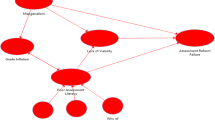Abstract
English is one of two official languages in Cameroon and it is used as L2 from pre-school to university. It therefore implies that the language is crucial in the academic achievement of primary school pupils. Success in the First School Leaving Certificate (FSLC) Examination marks the end of the primary cycle and possession of the first education certificate which opens the way to several avenues. However, failure in the English language paper would hardly lead to success in the examination. In addition, the majority of careers require success and competence in the English language. The English language paper then is High-Stakes, with great washback effects not only for pupils and candidates but also for various stakeholders. Recently, there have been loud cries on the disparity existing between English language results and language use of primary school students. The trend seems continuous right up to higher education. The question has been raised as to how to explain the mass success rate in English language in the FSLC Examination given the poor level of communication of students. Many reasons and explanations have been suggested for this state of affairs, such as the policy of education for all, the young ages of pupils, inadequate teaching materials, inadequate teacher training and development, and poor parental support. This chapter takes a critical look at the involvement of classroom teachers in the development, organisation, administration and marking of the English language paper in the FSLC Examination. The chapter attempts to examine the roles and duties of classroom teachers, and whether their involvement enhances or reduces the validity and reliability of the examination.
Access this chapter
Tax calculation will be finalised at checkout
Purchases are for personal use only
Similar content being viewed by others
References
Abrams, L. M., Pedulla, J. J., & Madaus, G. F. (2003). The impact of high-stakes testing. Theory Into Practice, 42, 18–29.
Anuchem, I. N. (2015). The organisation of marking and its impact on examiners’ marking proficiency in examinations organised by the Cameroon GCE Board. Dissertation, University of Buea, Cameroon.
Au, W. (2007). High-stakes testing and curricular control: A qualitative metasynthesis. Educational Researcher, 36, 258–267.
Ayres, P., Sawyer, W., & Dinham, S. (2004). Effective teaching in the context of a grade 12 high-stakes external examination in New South Wales. British Educational Research Journal, 30, 141–165.
Boardman, A. G., & Woodruff, A. L. (2004). Teacher change and ‘high-stakes’ assessment: What happens to professional development? Teaching and Teacher Education, 20, 545–557.
Bobda, A. S. (2004). Linguistic apartheid: English language policy in Africa. English Today, 20, 19–26.
Cimbricz, S. (2002). State-mandated testing and teachers’ beliefs and practice. Education Policy Analysis Archives, 10, 1–21.
Cohen, L., Manion, L., & Morrison, K. (2011). Research methods in education. New York/London: Routledge.
Diamond, J. B. (2007). Where the rubber meets the road: Rethinking the conception between high-stakes testing policy and classroom instruction. Sociology of Education, 80, 285–313.
Gregory, K., & Clarke, M. (2003). High-stakes assessment in England and Singapore. Theory Into Practice, 42, 66–74.
Herbert, J. P. (2000). High-stakes testing opportunities and risks for students of color, English language learners, and students with disabilities. New York: National Center on Accessing the General Curriculum.
Hoffman, J. V., Assaf, L. C., & Paris, S. G. (2001). High-stakes testing in reading: Today in Texas, tomorrow? The Reading Teacher, 54, 482–492.
Hughes, A. (2003). Testing for language teachers (2nd ed.). Cambridge: Cambridge University Press.
Johnson, K. (2008). Teaching children to use visual research methods. In P. Thomson (Ed.), Doing visual research with children and young people (pp. 77–94). London: Routledge.
Journell, W. (2010). The influence of high-stakes testing on high school teachers’ willingness to incorporate current political events in the curriculum. The High School Journal, 93, 111–125.
Kachru, B. (1985). Standards, codification and sociolinguistic realism: The English language in the outer circle. In R. Quirk & H. Widdowson (Eds.), English in the world. Cambridge: Cambridge University Press.
Ketter, J., & Pool, J. (2001). Exploring the impact of a high-stakes direct writing assessment in two high school classrooms. Research in the Teaching of English, 35, 344–393.
Kouega, J.-P. (2002). Uses of English in Southern British Cameroon. English Worldwide, 23, 93–113.
Kucha, H. (2013). Context-appropriate ELT pedagogy: An investigation in Cameroonian primary schools. Dissertation, University of Warwick, UK.
Linn, R. L. (2000). Assessments and accountability. Educational Researcher, 29, 4–15.
Ministry of National Education. (2000). National syllabuses for English speaking schools in Cameroon. Yaounde: Imprimérie Saint John.
Nwana, E. M. (2000). Coping with British and French inherited systems of education. In T. M. Ndongko & L. I. Tambo (Eds.), Educational development in Cameroon 1961–1999: Issues and perspectives (pp. 10–22). Platerville: Nkemnji Global Tech and University of Regina Press.
Prabhu, N. S. (1990). There is no best method: Why? TESOL Quarterly, 24, 161–176.
Sloane, F. C., & Kelly, A. E. (2003). Issues in high-stakes testing programs. Theory Into Practice, 42(1), 12–17.
Tambo, I. L. (2000). The national education forum of 1995. In T. M. Ndongko & I. L. Tambo (Eds.), Educational development in Cameroon 1961–1999: Issues and perspectives (pp. 257–265). Platerville: Nkemnji Global Tech and University of Regina Press.
Tchombe, T. M. (2014). Progressive transformative teacher education in Cameroon. Educational Leadership and Management Studies, 33, 23–32.
Tenjoh-Okwen, T. (2003). Lesson observation: The key to teacher development. English Teaching Forum, 41, 30–34.
Wall, D. (2000). The impact of high-stakes testing on teaching and learning: Can this be predicted or controlled? System, 28, 499–509.
Author information
Authors and Affiliations
Editor information
Editors and Affiliations
Rights and permissions
Copyright information
© 2018 Springer International Publishing AG, part of Springer Nature
About this chapter
Cite this chapter
Tante, A.C. (2018). A Critical Analysis of Teacher Involvement in the English Language Paper of the First School Leaving Certificate Examination (FSLC) in Cameroon. In: Xerri, D., Vella Briffa, P. (eds) Teacher Involvement in High-Stakes Language Testing. Springer, Cham. https://doi.org/10.1007/978-3-319-77177-9_3
Download citation
DOI: https://doi.org/10.1007/978-3-319-77177-9_3
Published:
Publisher Name: Springer, Cham
Print ISBN: 978-3-319-77175-5
Online ISBN: 978-3-319-77177-9
eBook Packages: EducationEducation (R0)




